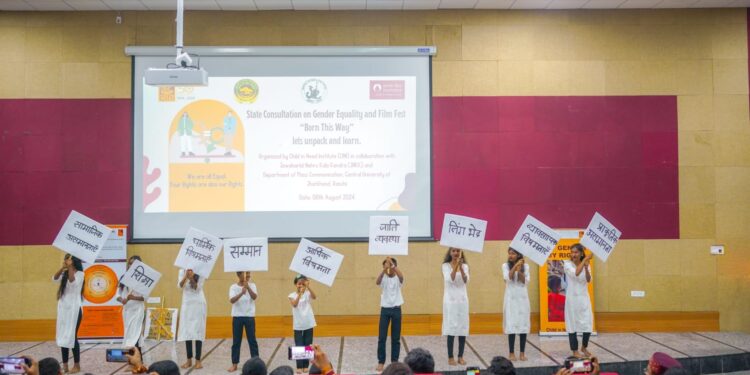Lagatar24 Desk
Ranchi: In a compelling showcase of the power of storytelling, a drama performed by children and adolescents from the Mausibari slum emerged as the centerpiece of an event focused on gender equity and inclusion, hosted by the Child in Need Institute (CINI) in collaboration with the Central University of Jharkhand (CUJ). The performance, which highlighted the harsh realities of gender inequality, captivated the audience and underscored the need for societal change.
The drama, performed by young residents of Mausibari—an area under CINI’s intervention—explored the profound impact of gender discrimination in their community. Trained by CINI’s dedicated team, the children and adolescents brought to life the struggles faced by marginalized groups, using their personal experiences to shed light on this pressing issue. Their performance was a poignant reminder of the challenges that persist in achieving gender equity, particularly in underprivileged communities.
The event began with a traditional lamp-lighting ceremony, followed by a keynote address from Professor Kunj Bihari Panda, Vice Chancellor (in charge) of CUJ, who emphasized the importance of inclusive education in fostering gender equity. However, it was the children’s drama that truly resonated with attendees, sparking deep reflection and conversations about the ongoing fight for equality.
The powerful narrative depicted in the drama was complemented by a series of short films screened later in the day, each highlighting social injustices faced by marginalized communities. These films, together with the drama, created a strong foundation for the interactive panel discussion that followed, moderated by Ms. Tanvi Jha, State Programme Manager at CINI.
The panel featured prominent voices in the field of gender equity, including Ms. Babita Sinha from CREA, Ms. Parul Sharma from UNICEF Jharkhand, Ms. Tanushree Sarkar from the Child Welfare Committee of Khunti District, and Mr. Akram Ansari from Bless M Bliss Foundation, Ranchi. The discussion centered on real-world challenges and the critical need for inclusive practices in all sectors of society.
The event concluded with a vibrant dance performance celebrating “Equal Rights for All,” choreographed by Ms. Sumedha Sengupta. Yet, it was the heartfelt drama by the children of Mausibari that left an indelible mark, highlighting the importance of empowering young voices to drive the message of gender equity and inclusion.
This event, attended by a diverse audience including government officials, civil society representatives, university students, and gender experts, marked a significant step in raising awareness and inspiring action towards a more inclusive society. The powerful performance by the Mausibari children not only stole the spotlight but also served as a rallying cry for continued efforts to combat gender inequality in all its forms.






